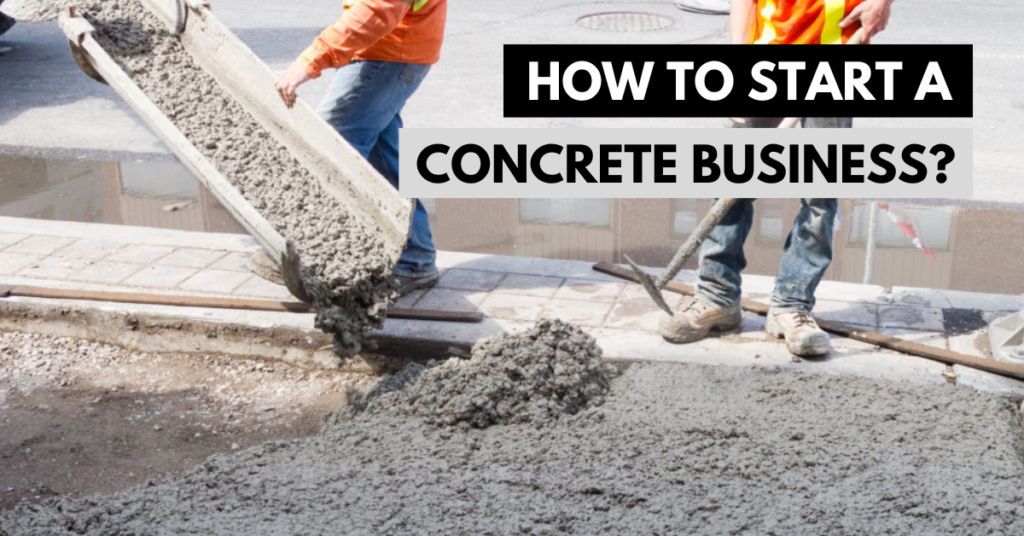Achieving financial freedom is not easy, but if you have the right guidance and resources, anything is possible. So let’s start with the main question. Are you passionate about concrete business? Do you have any experience in this field? If you have a history in construction and a strong interest in business, you may be ready to start your own company.
There is no question that the construction sector is expanding, which means that the concrete industry is also on the rise. But people get intimidated and never risk starting their own business. You can succeed if you have a good plan and the right resources.
In this article, we will walk you through the whole process and answer your question about how to start a concrete business. So let’s start the countdown.
How Profitable Is It to Own a Concrete Business?
Almost every building project necessitates the use of concrete. It is often used for foundations, walls, flooring, and roads. Economically, the concrete business is inextricably related to the larger construction industry, which is presently worth approximately $1.4 trillion.
In the year 2023, it is estimated to grow by 3%. A determined cement expert who wants to start their own business could take a sizable piece of the entire earnings. You can do your math here and see how profitable it is to dive into this industry.
With the right investment and networking, you can turn your business into six figures. So stop wasting your time and take action right now to experience financial freedom.
How Much Money Can This Business Generate?
The cost depends on the project you take. Many concrete businesses charge $1000 for a small task. You can charge $2500 to $3000 for medium projects, and large projects can reach more significant figures.
When starting your concrete firm, you should anticipate taking on a mix of projects, and the business’s predicted revenue heavily depends on the jobs you acquire.
Large firms are earning more than $100k a year. On the other hand, small companies are easily making $30000 to $50000. It also depends on your clients and workload. But the main point is that there is a lot of growth potential, and you can earn huge money if you put in the work.
11 Key Steps to Start a Concrete Business
After discussing the potential of this industry, let’s take you through the step to step guide to kickstart your business. You have to follow these steps closely if you want to stand out from the crowd and make money.
1. Do Your Research
Before establishing any business, conduct extensive research to guarantee that your idea is profitable with a consistent cash flow. Your study should include market trends, future rivals, and the risks of starting a company.
Take some time to consider the problems you may face and how you intend to deal with them. After all, you wouldn’t want to put your time and money into a company that lacks study and statistics to back it up. You need to check your competitors and see how they operate their business.
Subsequently, you will have to bring something new to the table to get ahead. So do your research carefully and note all the points you have come across.
2. Business Plan
You’re ready to create a business plan after completing your industry and market research. A business plan is a document that outlines your company’s potential.
The process of developing your plan guarantees that you have a thorough understanding of your market and your approach. The strategy also includes a road map for you to adhere to and, if necessary, submit to investors to raise funds for your firm.
The following are the things that should be included in your business plan:
- Market analysis
- Industry analysis
- Competitor analysis
- Financing
- Company Overview
- Marketing Plan
Make sure that you invest your time and properly make a business plan. You can hire a specialist as well for this purpose.
3. Choose Your Legal Entity
A corporate legal structure, often known as a business entity, defines how the government governs certain elements of your company. It includes debts and taxation. It gives your business a legal structure and helps you deal with future problems appropriately.
These are the business entities people mostly go for:
- Sole proprietorship
- General proprietorship
- Limited liability company
- Partnership
Every entity has its own set of advantages and disadvantages. You can consult with a lawyer as well if you need clarification. Most companies choose LLCs as they offer the most benefits, and in case of any accident, you will not be liable for the debts.
4. Finances For Your Business
After your business plan, you will get an idea of how much investment you need to start your business. You can ask your friends and family to invest in your business and be your partners. You can divide the profit later on.
If this option is not feasible, you can go for bank loans. All you need is a good credit history to get your hands on the loan. You have to pay back your loans with interest. But after two to three years, your business will be able to pay back all the money.
Another option is to go for Angel investors or crowdfunding. Angel investors will take a look at your business plan and see if the business has the potential to grow. If they like your plan, they will invest in your business. You can also go for crowdfunding. The main advantage is that you don’t have to pay back the money.
5. Decide A Location
A few aspects should be regarded while selecting a location for your concrete firm. First, you’ll need to choose a location large enough to hold supplies and equipment.
You should also locate a place near your consumers to simply deliver concrete products. Finally, you’ll need to choose an economic location with good infrastructure. Location plays a vital role in the success of your business, so choose wisely.
6. Register Your Business
The most significant step is registering with the IRS, as this is what makes your company official. Most business owners choose to register their companies in the state where they live.
But if you plan on selling to more than one state, you may need to register the company in additional states. Before submitting, review your state’s regulations and laws to ensure you have all you need.
7. License And Permits
A business license is needed to establish a concrete business. You must also meet any additional standards imposed by your state or locality. Consult your local licensing or regulatory agency for additional information.
You may benefit from speaking with a nearby lawyer who can provide direction and support in obtaining the necessary licenses.
8. Get Insurance
Many firms need to pay more attention to the importance of business insurance when they initially begin. However, it is the most effective technique to protect a company in the event of an accident at work.
While a business can obtain various insurance plans, general liability insurance is the most thorough. It provides protection for all business situations, from accidents to property harm.
9. Buy Equipment
A few important items of equipment are required to establish a concrete business. A mixer is required to combine the cement, sand, and water. To dump the concrete mixture into molds, you’ll require a wheelbarrow. Finally, a saw will be required to trim the concrete items to size.
Additional tools you need are a trowel, broom, and a wet saw. Make sure that you invest in good quality products. They will help you in doing great work that can lead to client satisfaction.
10. Open A Website
The next step is to open a website for your business. It is necessary to put yourself out there and build connections. You can list your services and pricing plans on the website. Make sure that you engage with your customers and facilitate them at every step.
11. Market Your Company
Marketing is about advertising a company and raising brand awareness through various means. Use all mediums to your benefit, from a website to social networks and banners.
Run targeted ads to hunt potential clients. You can also pitch directly to large companies and sell them your services. In the first year, be bold and market your business at every channel that you can find.
How Much Does It Cost to Start a Concrete Business?
The initial investment of this business is high. It can cost you around $20,000 to $30,000, depending on the scale of your company. You can go for different findings, as we have discussed above. You can easily make more than that in less than a year. So make sure you invest well and keep things under check.
Give It a Go
A concrete business has a lot of room for growth, and you can make a huge profit if you know how to start a concrete business. We have discussed in detail all the necessary things you should keep in mind when launching your own company. Make sure that you have a skilled team by your side and make calculated decisions to succeed in the market.
Frequently Asked Questions (FAQs)
Q: Is it necessary to create a logo for your business?
A: Yes, it will give your clients a professional look. You need to build a brand so that people can easily recognize your business and you can lock in good deals. For this purpose, having a logo is necessary. You can make a minimal logo if you don’t have a budget but take this step.
Q: How much does it cost to start a concrete business if you live in the countryside?
A: It does not make any significant difference. You need a starting investment of $20,000 to $25,000 to kickstart your business. You can go for bank loans if it seems like a lot and you are unable to cover it.
Q: How to expand your concrete business?A: You need to build connections in the market to succeed. Make sure that you satisfy your customers. After making some profit, you can open your branches in different states. One thing is to go slowly and carefully in the first few years.



